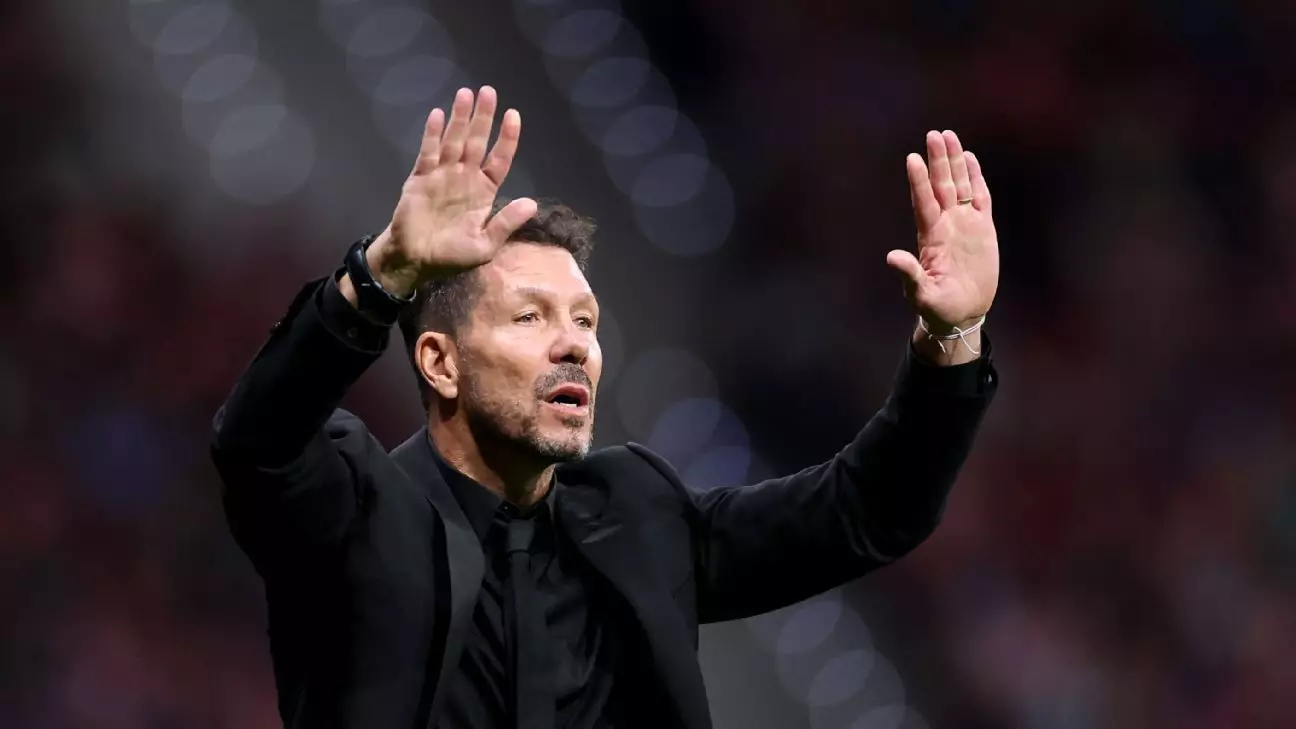The Madrid derby is always an event that elicits intense emotions from players and fans alike. However, the recent match between Atlético Madrid and Real Madrid spiraled into chaos when objects were hurled onto the pitch, leading to a temporary suspension of the game in the second half. Such incidents are regrettably becoming more common in modern football, challenging the integrity of the sport and the safety of everyone involved.
In this particular encounter, the atmosphere was electrifying until the players near one of the goals were forced to take refuge off the field due to the flying debris. The culprits, fans sitting behind the goal, were indiscriminately tossing items—lighters and plastic bottles reigning among them—creating a volatile situation that neither team nor their respective coaching staff anticipated. The game, already tense due to the closely contested nature of the rivalry, was momentarily halted as authorities sought to restore order.
Diego Simeone, head coach of Atlético Madrid, did not hold back in addressing the unruly behavior during a post-match interview. He expressed his frustrations towards the supporters, calling for them to think about their actions and the club’s image. But it was not just the fans who came under scrutiny; Simeone also highlighted a shared responsibility among players, particularly those who may provoke fan reactions with their celebrations.
Simeone’s comments about Real Madrid’s goalkeeper, Thibaut Courtois, were particularly striking. After Étder Militão scored the opening goal for Real Madrid, Courtois celebrated exuberantly, which according to Simeone, fanned the flames of the already volatile atmosphere. His assertion that the behavior of professional players directly influences fan reactions sheds light on the importance of emotional intelligence in competitive sports.
„We have to stay calm and understand the situation,“ Simeone stated, suggesting that players should celebrate goals with a degree of restraint in high-stakes matches like the derby. His wish for a more temperate approach reflects not only a desire to maintain the integrity of the game but also an acknowledgment of the social responsibilities that come with their roles as public figures.
In the wake of the incident, Atlético Madrid’s club officials quickly took action, cooperating with law enforcement to identify the individuals responsible for the disorder. They released a statement emphasizing the need for a supportive fan base dedicated to creating a positive environment. This immediate response illustrates a recognition of the long-term damage such incidents can inflict on a club’s reputation and the broader football community.
Similarly, Real Madrid’s Carlo Ancelotti praised the referee’s decision to pause the game. He positioned the interruption as a necessary measure to safeguard both players and fans, reiterating that the sport must prioritize safety over continued play. This consensus across both coaching staffs signifies a potentially unifying recognition in football that behavior and accountability must be dealt with more rigorously.
Furthermore, the match disturbances arose amidst an alarming social media campaign calling for racist behavior toward Real Madrid’s Vinícius Júnior, adding another layer of seriousness to this unfolding narrative. The Spanish league’s decision to take action against the promoters of such campaigns showcases both a zero-tolerance policy towards racism and an acknowledgment of the responsibilities clubs and fans share in confronting these issues.
The recent events serve as a stark reminder of the thin line that exists between passion and irresponsibility in the world of football. Fans are the lifeblood of any sport, providing the atmosphere that fuels competitive spirit. However, when that passion manifests into aggression or violence, it conflicts with the fundamental values of sportsmanship and respect.
Moving forward, both clubs and regulatory bodies must advocate for better recognition of the responsibilities inherent in following a professional sport. Player professionalism regarding goal celebrations must align with the equally important duty of fans to support their teams without resorting to hostility. Moreover, tackling issues like racism requires not only swift action but also a cultural shift among fans and institutions.
In the end, fostering a respectful and safe environment in football depends on everyone: the players, clubs, and, most importantly, the fans. Only through collective responsibility can the beautiful game maintain its integrity and rightful place in society as a unifying force rather than a catalyst for discord.


Napsat komentář